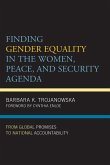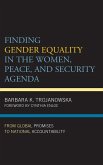The Oxford Handbook of Women, Peace, and Security
Herausgeber: Davies, Sara E; True, Jacqui
Schade – dieser Artikel ist leider ausverkauft. Sobald wir wissen, ob und wann der Artikel wieder verfügbar ist, informieren wir Sie an dieser Stelle.
The Oxford Handbook of Women, Peace, and Security
Herausgeber: Davies, Sara E; True, Jacqui
- Gebundenes Buch
- Merkliste
- Auf die Merkliste
- Bewerten Bewerten
- Teilen
- Produkt teilen
- Produkterinnerung
- Produkterinnerung
Passed in 2000, the United Nations Security Council Resolution 1325 and subsequent seven Resolutions make up the Women, Peace, and Security (WPS) agenda. This agenda is a significant international normative and policy framework addressing the gender-specific impacts of conflict on women and girls. The Oxford Handbook of Women, Peace, and Security brings together scholars, advocates, and policymakers to provide an overview of what we know concerning what works to promote women's participation in peace and security, what works to protect women and girls from sexual and gender-based violence and…mehr
Andere Kunden interessierten sich auch für
![Finding Gender Equality in the Women, Peace, and Security Agenda Finding Gender Equality in the Women, Peace, and Security Agenda]() Barbara K. TrojanowskaFinding Gender Equality in the Women, Peace, and Security Agenda43,99 €
Barbara K. TrojanowskaFinding Gender Equality in the Women, Peace, and Security Agenda43,99 €![The Politics of Women, Peace, and Security in UN Mediation The Politics of Women, Peace, and Security in UN Mediation]() Catriona StandfieldThe Politics of Women, Peace, and Security in UN Mediation97,99 €
Catriona StandfieldThe Politics of Women, Peace, and Security in UN Mediation97,99 €![Finding Gender Equality in the Women, Peace, and Security Agenda Finding Gender Equality in the Women, Peace, and Security Agenda]() Barbara K. TrojanowskaFinding Gender Equality in the Women, Peace, and Security Agenda117,99 €
Barbara K. TrojanowskaFinding Gender Equality in the Women, Peace, and Security Agenda117,99 €![The Oxford Handbook of Nuclear Security The Oxford Handbook of Nuclear Security]() Christopher HobbsThe Oxford Handbook of Nuclear Security137,99 €
Christopher HobbsThe Oxford Handbook of Nuclear Security137,99 €![The Oxford Handbook of Space Security The Oxford Handbook of Space Security]() Saadia M PekkanenThe Oxford Handbook of Space Security207,99 €
Saadia M PekkanenThe Oxford Handbook of Space Security207,99 €![The Oxford Handbook of Comparative Politics The Oxford Handbook of Comparative Politics]() The Oxford Handbook of Comparative Politics53,99 €
The Oxford Handbook of Comparative Politics53,99 €![Oxford Handbook of Political Communication Oxford Handbook of Political Communication]() Oxford Handbook of Political Communication222,99 €
Oxford Handbook of Political Communication222,99 €-
-
-
Passed in 2000, the United Nations Security Council Resolution 1325 and subsequent seven Resolutions make up the Women, Peace, and Security (WPS) agenda. This agenda is a significant international normative and policy framework addressing the gender-specific impacts of conflict on women and girls. The Oxford Handbook of Women, Peace, and Security brings together scholars, advocates, and policymakers to provide an overview of what we know concerning what works to promote women's participation in peace and security, what works to protect women and girls from sexual and gender-based violence and other human rights violations, and what works to prevent conflict and rebuild societies after conflict drawing on women's experiences and knowledge of building peace from local to global levels.
Produktdetails
- Produktdetails
- Verlag: Oxford University Press
- Seitenzahl: 920
- Erscheinungstermin: 10. Januar 2019
- Englisch
- Abmessung: 256mm x 180mm x 66mm
- Gewicht: 1717g
- ISBN-13: 9780190638276
- ISBN-10: 0190638273
- Artikelnr.: 52711424
- Herstellerkennzeichnung
- Libri GmbH
- Europaallee 1
- 36244 Bad Hersfeld
- gpsr@libri.de
- Verlag: Oxford University Press
- Seitenzahl: 920
- Erscheinungstermin: 10. Januar 2019
- Englisch
- Abmessung: 256mm x 180mm x 66mm
- Gewicht: 1717g
- ISBN-13: 9780190638276
- ISBN-10: 0190638273
- Artikelnr.: 52711424
- Herstellerkennzeichnung
- Libri GmbH
- Europaallee 1
- 36244 Bad Hersfeld
- gpsr@libri.de
Sara E. Davies is Associate Professor and Australian Research Council (ARC) Future Fellow in the School of Government and International Relations at Griffith University. She is also co-founder and co-editor of quarterly issued international journal Global Responsibility to Protect. Jacqui True is Professor of Politics & International Relations and Australian Research Council Future Fellow in the School of Social Sciences at Monash University. She is also an editorial board member of International Feminist Journal of Politics; International Studies Review; Global Responsibility to Protect; Political Science; and Women, Politics & Policy. She is the author of The Political Economy of Violence Against Women and co-editor of Scandalous Economics.
* Acknowledgments
* List of Contributors
* Part I. Concepts of WPS
* Chapter 1. Women, Peace, and Security: A Transformative Agenda?
* Sara E. Davies and Jacqui True
* Chapter 2. Peace and Security from a Feminist Perspective
* J. Ann Tickner
* Chapter 3. Adoption of 1325 Resolution
* Christine Chinkin
* Chapter 4. Civil Society's Leadership in Adopting Resolution 1325
* Sanam Naraghi Anderlini
* Chapter 5. Scholarly Debates and Contested Meanings of WPS
* Fionnuala D. NÍ Aoláin and Nahla Valji
* Chapter 6. Advocacy and the WPS Agenda
* Sarah Taylor
* Chapter 7. WPS as a Political Movement
* Swanee Hunt and Alice Wairimu Nderitu
* Chapter 8. Locating Masculinities in WPS
* Henri Myrttinen
* Chapter 9. WPS and Adopted Security Council Resolutions
* Laura J. Shepherd
* Chapter 10. WPS and Gender Mainstreaming: Practice, Purpose, and
Problems
* Karin Landgren
* Chapter 11. The Production of the 2015 Global Study
* Louise Olsson and Theodora-Ismene Gizelis
* Part II. Pillars of WPS
* Chapter 12. WPS and Conflict Prevention
* Bela Kapur and Madeleine Rees
* Chapter 13. What Works in Participation
* Thania Paffenholz
* Chapter 14. What Works (and Fails) in Protection
* Hannah Dönges and Janosch Kullenberg
* Chapter 15. What Works in Relief and Recovery
* Jacqui True and Sarah Hewitt
* Chapter 16. Where the WPS Pillars Intersect
* Marie O'Reilly
* Chapter 17. WPS and Female Peacekeepers
* Natasja Rupesinghe, Eli Stamnes, and John Karlsrud
* Chapter 18. WPS and SEA in Peacekeeping Operations
* Jasmine-Kim Westendorf
* Chapter 19. WPS and Peacekeeping Economies
* Kathleen M. Jennings
* Chapter 20. WPS in Military Training and Socialization
* Helena Carreiras and Teresa Fragoso
* Chapter 21. WPS and Policing: New Terrain
* Bethan Greener
* Chapter 22. WPS, States, and the National Action Plans
* Mirsad Miki Jacevic
* Part III. Institutionalizing WPS
* Chapter 23. WPS inside the United Nations
* Megan Dersnah
* Chapter 24. WPS and the Special Representative of the
Secretary-General for Sexual Violence in Conflict
* Eleanor O'Gorman
* Chapter 25. WPS and Human Rights Council
* Rashida Manjoo
* Chapter 26. WPS and International Financial Institutions
* Jacqui True and Barbro Svedberg
* Chapter 27. WPS and the International Criminal Court
* Jonneke Koomen
* Chapter 28. WPS and North Atlantic Treaty Organization
* StÃ(c)fanie von Hlatky
* Chapter 29. WPS and the African Union
* Toni Haastrup
* Chapter 30. WPS and the Association of South East Asian Nations
* Ma. Lourdes Veneracion-Rallonza
* Chapter 31. WPS and Pacific Islands Forum
* Sharon Bhagwan-Rolls and Sian Rolls
* Chapter 32. WPS and Organization of American States
* Mary K. Meyer McAleese
* Chapter 33. WPS and Civil Society
* Annika Björkdahl and Johanna Mannergren Selimovic
* Chapter 34. WPS and Transnational Feminist Networks
* Joy Onyesoh
* Part IV. Implementing WPS
* Chapter 35. Delivering WPS Protection in All Female Peacekeeping
Force: The Case of Liberia
* Sabrina Karim
* Chapter 36. Securing Participation and Protection in Peace
Agreements: The Case of Colombia
* Isabela MarÍn Carvajal and Eduardo Ãlvarez-Vanegas
* Chapter 37. WPS and Women's Roles in Conflict-Prevention: The Case of
Bougainville
* Nicole George
* Chapter 38. Women in Rebellion: The Case of Sierra Leone
* Zoe Marks
* Chapter 39. Protecting Displaced Women and Girls: The Case of Syria
* Elizabeth Ferris
* Chapter 40. Donor States Delivering on WPS: The Case of Norway
* Inger Skjelsbæk and Torunn L. Tryggestad
* Chapter 41. WPS as Diplomatic Vocation: The Case of China
* Liu Tiewa
* Chapter 42. Women Controlling Arms, Building Peace: The Case of the
Philippines
* Jasmin Nario-Galace
* Chapter 43. Where Pillars Intersect (or Fail): The Case of WPS in
Afghanistan
* Claire Duncanson and Vanessa Farr
* Chapter 44. Mainstreaming WPS in the Armed Forces: The Case of
Australia
* Jennifer Wittwer
* Part V. Cross-Cutting Agenda? Connections and Mainstreaming
* Chapter 45. WPS and Responsibility to Protect
* Alex J. Bellamy and Sara E. Davies
* Chapter 46. WPS and Protection of Civilians
* Lisa Hultman and Angela Muvumba Sellström
* Chapter 47. WPS, Children, and Armed Conflict
* Katrina Lee-Koo
* Chapter 48. WPS, Gender, and Disabilities
* Deborah Stienstra
* Chapter 49. WPS and Humanitarian Disasters
* Sarah Martin and Devanna de la Puente
* Chapter 50. WPS, Migration, and Displacement
* Lucy Hall
* Chapter 51. WPS and LGBTI Rights
* Lisa Davis and Jessica Stern
* Chapter 52. WPS and CEDAW, Optional Protocol, and General
Recommendations
* Catherine O'Rourke with Aisling Swaine
* Chapter 53. Women's Roles in CVE
* Sri Wiyanti Eddyono with Sara E. Davies
* Chapter 54. WPS and Arms Trade Treaty
* Ray Acheson and Maria Butler
* Chapter 55. WPS and Sustainable Development Goals
* Radhika Balakrishnan and Krishanti Dharmaraj
* Chapter 56. WPS and the Convention against Torture
* Andrea Huber and Therese Rytter
* Chapter 57. WPS and Climate Change
* Annica Kronsell
* Part VI. Ongoing and Future Challenges
* Chapter 58. Global Study: Looking Forward
* Radhika Coomaraswamy and Emily Kenney
* Chapter 59. Measuring WPS: A New Global Index
* Jeni Klugman
* Chapter 60. Pursuing Gender Security
* Aisling Swaine
* Chapter 61. The Challenge of Foreign Policy in the WPS Agenda
* Valerie M. Hudson and Lauren A. Eason
* Chapter 62. Networked Advocacy
* Yifat Susskind and Diana Duarte
* Chapter 63. Women's Peacemaking in South Asia
* Meenakshi Gopinath and Rita Manchanda
* Chapter 64. WPS, Peace Negotiations, and Peace Agreements
* Karin Aggestam
* Chapter 65. The WPS "Agenda": A Postcolonial Critique
* Swati Parashar
* Chapter 66. The WPS Agenda and Strategy for the Twenty-First Century
* Chantal de Jonge Oudraat
* Chapter 67. The challenges of Monitoring and Analyzing WPS for
Scholars
* Natalie Florea Hudson
* Index
* List of Contributors
* Part I. Concepts of WPS
* Chapter 1. Women, Peace, and Security: A Transformative Agenda?
* Sara E. Davies and Jacqui True
* Chapter 2. Peace and Security from a Feminist Perspective
* J. Ann Tickner
* Chapter 3. Adoption of 1325 Resolution
* Christine Chinkin
* Chapter 4. Civil Society's Leadership in Adopting Resolution 1325
* Sanam Naraghi Anderlini
* Chapter 5. Scholarly Debates and Contested Meanings of WPS
* Fionnuala D. NÍ Aoláin and Nahla Valji
* Chapter 6. Advocacy and the WPS Agenda
* Sarah Taylor
* Chapter 7. WPS as a Political Movement
* Swanee Hunt and Alice Wairimu Nderitu
* Chapter 8. Locating Masculinities in WPS
* Henri Myrttinen
* Chapter 9. WPS and Adopted Security Council Resolutions
* Laura J. Shepherd
* Chapter 10. WPS and Gender Mainstreaming: Practice, Purpose, and
Problems
* Karin Landgren
* Chapter 11. The Production of the 2015 Global Study
* Louise Olsson and Theodora-Ismene Gizelis
* Part II. Pillars of WPS
* Chapter 12. WPS and Conflict Prevention
* Bela Kapur and Madeleine Rees
* Chapter 13. What Works in Participation
* Thania Paffenholz
* Chapter 14. What Works (and Fails) in Protection
* Hannah Dönges and Janosch Kullenberg
* Chapter 15. What Works in Relief and Recovery
* Jacqui True and Sarah Hewitt
* Chapter 16. Where the WPS Pillars Intersect
* Marie O'Reilly
* Chapter 17. WPS and Female Peacekeepers
* Natasja Rupesinghe, Eli Stamnes, and John Karlsrud
* Chapter 18. WPS and SEA in Peacekeeping Operations
* Jasmine-Kim Westendorf
* Chapter 19. WPS and Peacekeeping Economies
* Kathleen M. Jennings
* Chapter 20. WPS in Military Training and Socialization
* Helena Carreiras and Teresa Fragoso
* Chapter 21. WPS and Policing: New Terrain
* Bethan Greener
* Chapter 22. WPS, States, and the National Action Plans
* Mirsad Miki Jacevic
* Part III. Institutionalizing WPS
* Chapter 23. WPS inside the United Nations
* Megan Dersnah
* Chapter 24. WPS and the Special Representative of the
Secretary-General for Sexual Violence in Conflict
* Eleanor O'Gorman
* Chapter 25. WPS and Human Rights Council
* Rashida Manjoo
* Chapter 26. WPS and International Financial Institutions
* Jacqui True and Barbro Svedberg
* Chapter 27. WPS and the International Criminal Court
* Jonneke Koomen
* Chapter 28. WPS and North Atlantic Treaty Organization
* StÃ(c)fanie von Hlatky
* Chapter 29. WPS and the African Union
* Toni Haastrup
* Chapter 30. WPS and the Association of South East Asian Nations
* Ma. Lourdes Veneracion-Rallonza
* Chapter 31. WPS and Pacific Islands Forum
* Sharon Bhagwan-Rolls and Sian Rolls
* Chapter 32. WPS and Organization of American States
* Mary K. Meyer McAleese
* Chapter 33. WPS and Civil Society
* Annika Björkdahl and Johanna Mannergren Selimovic
* Chapter 34. WPS and Transnational Feminist Networks
* Joy Onyesoh
* Part IV. Implementing WPS
* Chapter 35. Delivering WPS Protection in All Female Peacekeeping
Force: The Case of Liberia
* Sabrina Karim
* Chapter 36. Securing Participation and Protection in Peace
Agreements: The Case of Colombia
* Isabela MarÍn Carvajal and Eduardo Ãlvarez-Vanegas
* Chapter 37. WPS and Women's Roles in Conflict-Prevention: The Case of
Bougainville
* Nicole George
* Chapter 38. Women in Rebellion: The Case of Sierra Leone
* Zoe Marks
* Chapter 39. Protecting Displaced Women and Girls: The Case of Syria
* Elizabeth Ferris
* Chapter 40. Donor States Delivering on WPS: The Case of Norway
* Inger Skjelsbæk and Torunn L. Tryggestad
* Chapter 41. WPS as Diplomatic Vocation: The Case of China
* Liu Tiewa
* Chapter 42. Women Controlling Arms, Building Peace: The Case of the
Philippines
* Jasmin Nario-Galace
* Chapter 43. Where Pillars Intersect (or Fail): The Case of WPS in
Afghanistan
* Claire Duncanson and Vanessa Farr
* Chapter 44. Mainstreaming WPS in the Armed Forces: The Case of
Australia
* Jennifer Wittwer
* Part V. Cross-Cutting Agenda? Connections and Mainstreaming
* Chapter 45. WPS and Responsibility to Protect
* Alex J. Bellamy and Sara E. Davies
* Chapter 46. WPS and Protection of Civilians
* Lisa Hultman and Angela Muvumba Sellström
* Chapter 47. WPS, Children, and Armed Conflict
* Katrina Lee-Koo
* Chapter 48. WPS, Gender, and Disabilities
* Deborah Stienstra
* Chapter 49. WPS and Humanitarian Disasters
* Sarah Martin and Devanna de la Puente
* Chapter 50. WPS, Migration, and Displacement
* Lucy Hall
* Chapter 51. WPS and LGBTI Rights
* Lisa Davis and Jessica Stern
* Chapter 52. WPS and CEDAW, Optional Protocol, and General
Recommendations
* Catherine O'Rourke with Aisling Swaine
* Chapter 53. Women's Roles in CVE
* Sri Wiyanti Eddyono with Sara E. Davies
* Chapter 54. WPS and Arms Trade Treaty
* Ray Acheson and Maria Butler
* Chapter 55. WPS and Sustainable Development Goals
* Radhika Balakrishnan and Krishanti Dharmaraj
* Chapter 56. WPS and the Convention against Torture
* Andrea Huber and Therese Rytter
* Chapter 57. WPS and Climate Change
* Annica Kronsell
* Part VI. Ongoing and Future Challenges
* Chapter 58. Global Study: Looking Forward
* Radhika Coomaraswamy and Emily Kenney
* Chapter 59. Measuring WPS: A New Global Index
* Jeni Klugman
* Chapter 60. Pursuing Gender Security
* Aisling Swaine
* Chapter 61. The Challenge of Foreign Policy in the WPS Agenda
* Valerie M. Hudson and Lauren A. Eason
* Chapter 62. Networked Advocacy
* Yifat Susskind and Diana Duarte
* Chapter 63. Women's Peacemaking in South Asia
* Meenakshi Gopinath and Rita Manchanda
* Chapter 64. WPS, Peace Negotiations, and Peace Agreements
* Karin Aggestam
* Chapter 65. The WPS "Agenda": A Postcolonial Critique
* Swati Parashar
* Chapter 66. The WPS Agenda and Strategy for the Twenty-First Century
* Chantal de Jonge Oudraat
* Chapter 67. The challenges of Monitoring and Analyzing WPS for
Scholars
* Natalie Florea Hudson
* Index
* Acknowledgments
* List of Contributors
* Part I. Concepts of WPS
* Chapter 1. Women, Peace, and Security: A Transformative Agenda?
* Sara E. Davies and Jacqui True
* Chapter 2. Peace and Security from a Feminist Perspective
* J. Ann Tickner
* Chapter 3. Adoption of 1325 Resolution
* Christine Chinkin
* Chapter 4. Civil Society's Leadership in Adopting Resolution 1325
* Sanam Naraghi Anderlini
* Chapter 5. Scholarly Debates and Contested Meanings of WPS
* Fionnuala D. NÍ Aoláin and Nahla Valji
* Chapter 6. Advocacy and the WPS Agenda
* Sarah Taylor
* Chapter 7. WPS as a Political Movement
* Swanee Hunt and Alice Wairimu Nderitu
* Chapter 8. Locating Masculinities in WPS
* Henri Myrttinen
* Chapter 9. WPS and Adopted Security Council Resolutions
* Laura J. Shepherd
* Chapter 10. WPS and Gender Mainstreaming: Practice, Purpose, and
Problems
* Karin Landgren
* Chapter 11. The Production of the 2015 Global Study
* Louise Olsson and Theodora-Ismene Gizelis
* Part II. Pillars of WPS
* Chapter 12. WPS and Conflict Prevention
* Bela Kapur and Madeleine Rees
* Chapter 13. What Works in Participation
* Thania Paffenholz
* Chapter 14. What Works (and Fails) in Protection
* Hannah Dönges and Janosch Kullenberg
* Chapter 15. What Works in Relief and Recovery
* Jacqui True and Sarah Hewitt
* Chapter 16. Where the WPS Pillars Intersect
* Marie O'Reilly
* Chapter 17. WPS and Female Peacekeepers
* Natasja Rupesinghe, Eli Stamnes, and John Karlsrud
* Chapter 18. WPS and SEA in Peacekeeping Operations
* Jasmine-Kim Westendorf
* Chapter 19. WPS and Peacekeeping Economies
* Kathleen M. Jennings
* Chapter 20. WPS in Military Training and Socialization
* Helena Carreiras and Teresa Fragoso
* Chapter 21. WPS and Policing: New Terrain
* Bethan Greener
* Chapter 22. WPS, States, and the National Action Plans
* Mirsad Miki Jacevic
* Part III. Institutionalizing WPS
* Chapter 23. WPS inside the United Nations
* Megan Dersnah
* Chapter 24. WPS and the Special Representative of the
Secretary-General for Sexual Violence in Conflict
* Eleanor O'Gorman
* Chapter 25. WPS and Human Rights Council
* Rashida Manjoo
* Chapter 26. WPS and International Financial Institutions
* Jacqui True and Barbro Svedberg
* Chapter 27. WPS and the International Criminal Court
* Jonneke Koomen
* Chapter 28. WPS and North Atlantic Treaty Organization
* StÃ(c)fanie von Hlatky
* Chapter 29. WPS and the African Union
* Toni Haastrup
* Chapter 30. WPS and the Association of South East Asian Nations
* Ma. Lourdes Veneracion-Rallonza
* Chapter 31. WPS and Pacific Islands Forum
* Sharon Bhagwan-Rolls and Sian Rolls
* Chapter 32. WPS and Organization of American States
* Mary K. Meyer McAleese
* Chapter 33. WPS and Civil Society
* Annika Björkdahl and Johanna Mannergren Selimovic
* Chapter 34. WPS and Transnational Feminist Networks
* Joy Onyesoh
* Part IV. Implementing WPS
* Chapter 35. Delivering WPS Protection in All Female Peacekeeping
Force: The Case of Liberia
* Sabrina Karim
* Chapter 36. Securing Participation and Protection in Peace
Agreements: The Case of Colombia
* Isabela MarÍn Carvajal and Eduardo Ãlvarez-Vanegas
* Chapter 37. WPS and Women's Roles in Conflict-Prevention: The Case of
Bougainville
* Nicole George
* Chapter 38. Women in Rebellion: The Case of Sierra Leone
* Zoe Marks
* Chapter 39. Protecting Displaced Women and Girls: The Case of Syria
* Elizabeth Ferris
* Chapter 40. Donor States Delivering on WPS: The Case of Norway
* Inger Skjelsbæk and Torunn L. Tryggestad
* Chapter 41. WPS as Diplomatic Vocation: The Case of China
* Liu Tiewa
* Chapter 42. Women Controlling Arms, Building Peace: The Case of the
Philippines
* Jasmin Nario-Galace
* Chapter 43. Where Pillars Intersect (or Fail): The Case of WPS in
Afghanistan
* Claire Duncanson and Vanessa Farr
* Chapter 44. Mainstreaming WPS in the Armed Forces: The Case of
Australia
* Jennifer Wittwer
* Part V. Cross-Cutting Agenda? Connections and Mainstreaming
* Chapter 45. WPS and Responsibility to Protect
* Alex J. Bellamy and Sara E. Davies
* Chapter 46. WPS and Protection of Civilians
* Lisa Hultman and Angela Muvumba Sellström
* Chapter 47. WPS, Children, and Armed Conflict
* Katrina Lee-Koo
* Chapter 48. WPS, Gender, and Disabilities
* Deborah Stienstra
* Chapter 49. WPS and Humanitarian Disasters
* Sarah Martin and Devanna de la Puente
* Chapter 50. WPS, Migration, and Displacement
* Lucy Hall
* Chapter 51. WPS and LGBTI Rights
* Lisa Davis and Jessica Stern
* Chapter 52. WPS and CEDAW, Optional Protocol, and General
Recommendations
* Catherine O'Rourke with Aisling Swaine
* Chapter 53. Women's Roles in CVE
* Sri Wiyanti Eddyono with Sara E. Davies
* Chapter 54. WPS and Arms Trade Treaty
* Ray Acheson and Maria Butler
* Chapter 55. WPS and Sustainable Development Goals
* Radhika Balakrishnan and Krishanti Dharmaraj
* Chapter 56. WPS and the Convention against Torture
* Andrea Huber and Therese Rytter
* Chapter 57. WPS and Climate Change
* Annica Kronsell
* Part VI. Ongoing and Future Challenges
* Chapter 58. Global Study: Looking Forward
* Radhika Coomaraswamy and Emily Kenney
* Chapter 59. Measuring WPS: A New Global Index
* Jeni Klugman
* Chapter 60. Pursuing Gender Security
* Aisling Swaine
* Chapter 61. The Challenge of Foreign Policy in the WPS Agenda
* Valerie M. Hudson and Lauren A. Eason
* Chapter 62. Networked Advocacy
* Yifat Susskind and Diana Duarte
* Chapter 63. Women's Peacemaking in South Asia
* Meenakshi Gopinath and Rita Manchanda
* Chapter 64. WPS, Peace Negotiations, and Peace Agreements
* Karin Aggestam
* Chapter 65. The WPS "Agenda": A Postcolonial Critique
* Swati Parashar
* Chapter 66. The WPS Agenda and Strategy for the Twenty-First Century
* Chantal de Jonge Oudraat
* Chapter 67. The challenges of Monitoring and Analyzing WPS for
Scholars
* Natalie Florea Hudson
* Index
* List of Contributors
* Part I. Concepts of WPS
* Chapter 1. Women, Peace, and Security: A Transformative Agenda?
* Sara E. Davies and Jacqui True
* Chapter 2. Peace and Security from a Feminist Perspective
* J. Ann Tickner
* Chapter 3. Adoption of 1325 Resolution
* Christine Chinkin
* Chapter 4. Civil Society's Leadership in Adopting Resolution 1325
* Sanam Naraghi Anderlini
* Chapter 5. Scholarly Debates and Contested Meanings of WPS
* Fionnuala D. NÍ Aoláin and Nahla Valji
* Chapter 6. Advocacy and the WPS Agenda
* Sarah Taylor
* Chapter 7. WPS as a Political Movement
* Swanee Hunt and Alice Wairimu Nderitu
* Chapter 8. Locating Masculinities in WPS
* Henri Myrttinen
* Chapter 9. WPS and Adopted Security Council Resolutions
* Laura J. Shepherd
* Chapter 10. WPS and Gender Mainstreaming: Practice, Purpose, and
Problems
* Karin Landgren
* Chapter 11. The Production of the 2015 Global Study
* Louise Olsson and Theodora-Ismene Gizelis
* Part II. Pillars of WPS
* Chapter 12. WPS and Conflict Prevention
* Bela Kapur and Madeleine Rees
* Chapter 13. What Works in Participation
* Thania Paffenholz
* Chapter 14. What Works (and Fails) in Protection
* Hannah Dönges and Janosch Kullenberg
* Chapter 15. What Works in Relief and Recovery
* Jacqui True and Sarah Hewitt
* Chapter 16. Where the WPS Pillars Intersect
* Marie O'Reilly
* Chapter 17. WPS and Female Peacekeepers
* Natasja Rupesinghe, Eli Stamnes, and John Karlsrud
* Chapter 18. WPS and SEA in Peacekeeping Operations
* Jasmine-Kim Westendorf
* Chapter 19. WPS and Peacekeeping Economies
* Kathleen M. Jennings
* Chapter 20. WPS in Military Training and Socialization
* Helena Carreiras and Teresa Fragoso
* Chapter 21. WPS and Policing: New Terrain
* Bethan Greener
* Chapter 22. WPS, States, and the National Action Plans
* Mirsad Miki Jacevic
* Part III. Institutionalizing WPS
* Chapter 23. WPS inside the United Nations
* Megan Dersnah
* Chapter 24. WPS and the Special Representative of the
Secretary-General for Sexual Violence in Conflict
* Eleanor O'Gorman
* Chapter 25. WPS and Human Rights Council
* Rashida Manjoo
* Chapter 26. WPS and International Financial Institutions
* Jacqui True and Barbro Svedberg
* Chapter 27. WPS and the International Criminal Court
* Jonneke Koomen
* Chapter 28. WPS and North Atlantic Treaty Organization
* StÃ(c)fanie von Hlatky
* Chapter 29. WPS and the African Union
* Toni Haastrup
* Chapter 30. WPS and the Association of South East Asian Nations
* Ma. Lourdes Veneracion-Rallonza
* Chapter 31. WPS and Pacific Islands Forum
* Sharon Bhagwan-Rolls and Sian Rolls
* Chapter 32. WPS and Organization of American States
* Mary K. Meyer McAleese
* Chapter 33. WPS and Civil Society
* Annika Björkdahl and Johanna Mannergren Selimovic
* Chapter 34. WPS and Transnational Feminist Networks
* Joy Onyesoh
* Part IV. Implementing WPS
* Chapter 35. Delivering WPS Protection in All Female Peacekeeping
Force: The Case of Liberia
* Sabrina Karim
* Chapter 36. Securing Participation and Protection in Peace
Agreements: The Case of Colombia
* Isabela MarÍn Carvajal and Eduardo Ãlvarez-Vanegas
* Chapter 37. WPS and Women's Roles in Conflict-Prevention: The Case of
Bougainville
* Nicole George
* Chapter 38. Women in Rebellion: The Case of Sierra Leone
* Zoe Marks
* Chapter 39. Protecting Displaced Women and Girls: The Case of Syria
* Elizabeth Ferris
* Chapter 40. Donor States Delivering on WPS: The Case of Norway
* Inger Skjelsbæk and Torunn L. Tryggestad
* Chapter 41. WPS as Diplomatic Vocation: The Case of China
* Liu Tiewa
* Chapter 42. Women Controlling Arms, Building Peace: The Case of the
Philippines
* Jasmin Nario-Galace
* Chapter 43. Where Pillars Intersect (or Fail): The Case of WPS in
Afghanistan
* Claire Duncanson and Vanessa Farr
* Chapter 44. Mainstreaming WPS in the Armed Forces: The Case of
Australia
* Jennifer Wittwer
* Part V. Cross-Cutting Agenda? Connections and Mainstreaming
* Chapter 45. WPS and Responsibility to Protect
* Alex J. Bellamy and Sara E. Davies
* Chapter 46. WPS and Protection of Civilians
* Lisa Hultman and Angela Muvumba Sellström
* Chapter 47. WPS, Children, and Armed Conflict
* Katrina Lee-Koo
* Chapter 48. WPS, Gender, and Disabilities
* Deborah Stienstra
* Chapter 49. WPS and Humanitarian Disasters
* Sarah Martin and Devanna de la Puente
* Chapter 50. WPS, Migration, and Displacement
* Lucy Hall
* Chapter 51. WPS and LGBTI Rights
* Lisa Davis and Jessica Stern
* Chapter 52. WPS and CEDAW, Optional Protocol, and General
Recommendations
* Catherine O'Rourke with Aisling Swaine
* Chapter 53. Women's Roles in CVE
* Sri Wiyanti Eddyono with Sara E. Davies
* Chapter 54. WPS and Arms Trade Treaty
* Ray Acheson and Maria Butler
* Chapter 55. WPS and Sustainable Development Goals
* Radhika Balakrishnan and Krishanti Dharmaraj
* Chapter 56. WPS and the Convention against Torture
* Andrea Huber and Therese Rytter
* Chapter 57. WPS and Climate Change
* Annica Kronsell
* Part VI. Ongoing and Future Challenges
* Chapter 58. Global Study: Looking Forward
* Radhika Coomaraswamy and Emily Kenney
* Chapter 59. Measuring WPS: A New Global Index
* Jeni Klugman
* Chapter 60. Pursuing Gender Security
* Aisling Swaine
* Chapter 61. The Challenge of Foreign Policy in the WPS Agenda
* Valerie M. Hudson and Lauren A. Eason
* Chapter 62. Networked Advocacy
* Yifat Susskind and Diana Duarte
* Chapter 63. Women's Peacemaking in South Asia
* Meenakshi Gopinath and Rita Manchanda
* Chapter 64. WPS, Peace Negotiations, and Peace Agreements
* Karin Aggestam
* Chapter 65. The WPS "Agenda": A Postcolonial Critique
* Swati Parashar
* Chapter 66. The WPS Agenda and Strategy for the Twenty-First Century
* Chantal de Jonge Oudraat
* Chapter 67. The challenges of Monitoring and Analyzing WPS for
Scholars
* Natalie Florea Hudson
* Index








